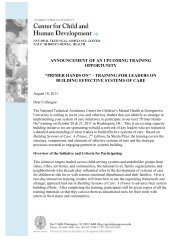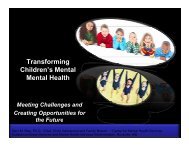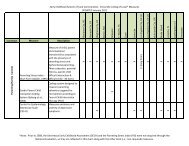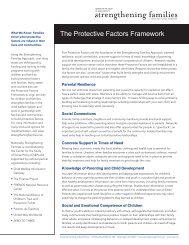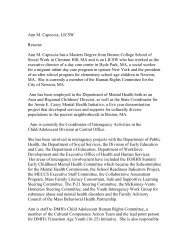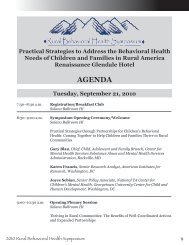Training Institutes 2012 - National Technical Assistance Center for ...
Training Institutes 2012 - National Technical Assistance Center for ...
Training Institutes 2012 - National Technical Assistance Center for ...
Create successful ePaper yourself
Turn your PDF publications into a flip-book with our unique Google optimized e-Paper software.
INSTITUTE #29 8:30 AM FRIDAY • 1:30 PM SATURDAY • SUN C<br />
Creating Trauma-In<strong>for</strong>med Child Welfare Systems:<br />
Bridging the Gap Between Child Welfare and Mental Health<br />
INSTITUTES<br />
OBJECTIVES—Participants will learn:<br />
1. To explain the importance of creating a trauma-in<strong>for</strong>med child welfare system<br />
2. To identify the essential elements of a trauma-in<strong>for</strong>med child welfare system<br />
3. To analyze how a child welfare system can be a traumatic experience to birth parents and use strategies <strong>for</strong> creating<br />
a trauma-in<strong>for</strong>med system that actively engages birth parents<br />
4. How to use a trauma-in<strong>for</strong>med community assessment<br />
5. To employ trauma-focused screening, referral, and assessment strategies that can lead to effective collaboration<br />
between mental health and child welfare systems<br />
6. To implement small changes that lead to broader policy and practice changes within the child welfare systems and<br />
improved partnerships between child welfare and mental health<br />
This Institute will focus on the concept of trauma-in<strong>for</strong>med child welfare systems and on specific, concrete strategies to<br />
support the evolution of public child welfare agencies into trauma-in<strong>for</strong>med organizations and to serve as agents of<br />
change in their communities. Faculty will highlight essential elements of trauma-in<strong>for</strong>med child welfare systems and<br />
how to operationalize these elements through policy and practice changes at the child welfare agency level. Strategies to<br />
be discussed include a community assessment process, integrating screening and assessment practices, partnering with<br />
family members and caregivers, and resource development.<br />
The in<strong>for</strong>mation and strategies presented are based on the Essential Elements of Trauma-In<strong>for</strong>med Child Welfare<br />
Systems created by the Child Welfare Committee of the <strong>National</strong> Child Traumatic Stress Network. The elements provide<br />
an organizing framework to assist child welfare systems in their ef<strong>for</strong>ts to implement trauma-in<strong>for</strong>med policies and<br />
practices. The strategies are also designed to improve the partnership and collaboration between child welfare and<br />
mental health agencies.<br />
Specific topics to be covered include:<br />
• How to operationalize the overarching concepts on trauma-in<strong>for</strong>med systems into concrete policy and practice changes<br />
• How to implement a community assessment process designed to evaluate the trauma-in<strong>for</strong>med nature of their child<br />
welfare systems that was pilot tested in three “laboratory sites” across the country<br />
• How to better link the child welfare and mental health systems through a trauma screening, referral,<br />
and assessment process<br />
• Partnering with birth parents and resource parents<br />
• How to develop resources to support ef<strong>for</strong>ts to create trauma-in<strong>for</strong>med child welfare systems<br />
Attendees will participate in multiple activities, including reviewing and discussing the community assessment process<br />
in a small group <strong>for</strong>mat, reviewing existing trauma screening tools, and engaging in a discussion of the benefits and<br />
challenges associated with implementing each tool. Participants will also brainstorm ways in which they can effectively<br />
integrate trauma screening practices into their own community. Participants will be encouraged to identify three<br />
concrete policy and practice changes they can take back to their own jurisdiction and apply in the immediate future. The<br />
faculty team <strong>for</strong> the session will offer the perspectives of a child welfare agency administrator, a birth parent, and a<br />
clinical psychologist who serves as the project manager.<br />
MODERATOR/PRESENTER: Lisa Conradi, Psy.D., CTISP Project Manager, Chadwich <strong>Center</strong> <strong>for</strong> Children and<br />
Families at Rady, Children’s Hospital Health <strong>Center</strong> San Diego, San Diego, CA<br />
Pamela Toohey, CEO, Birth Parent Association, El Cajon, CA<br />
Debra Zanders-Willis, Director, Child Welfare Services, San Diego County Child Welfare Services, County of San<br />
Diego, San Diego, CA<br />
<strong>Training</strong> <strong>Institutes</strong> <strong>2012</strong><br />
61



